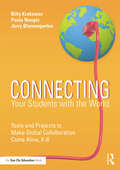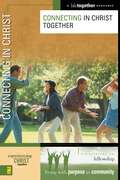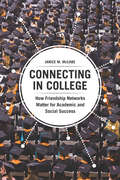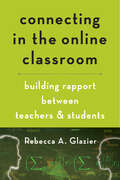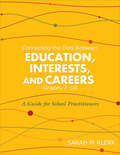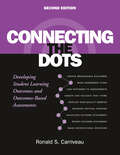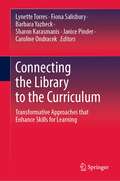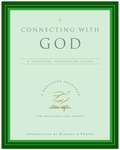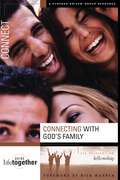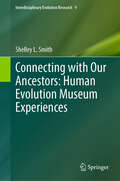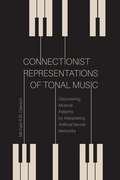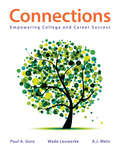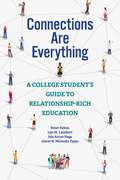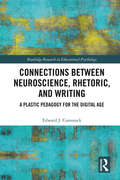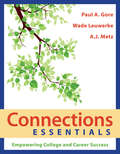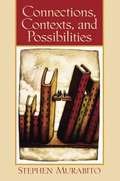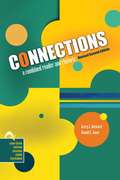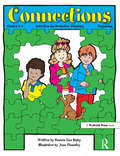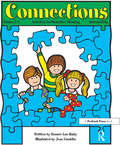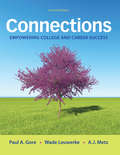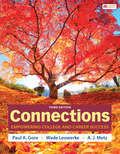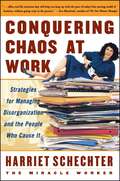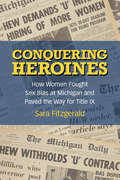- Table View
- List View
Connecting Your Students with the World: Tools and Projects to Make Global Collaboration Come Alive, K-8
by Billy Krakower Paula Naugle Jerry BlumengartenMake the most of today’s technology to give your students a more interactive, authentic learning experience! Connecting Your Students with the World shows you how to use web tools to get K–8 students in touch with other classrooms worldwide. This book is a valuable resource to help you find and communicate with other teachers and classrooms and even design your own collaborative online projects. You’ll find out how to: Conduct videoconferencing calls to put your students in touch with classrooms around the world; Embark on Virtual Field Trips; Plan themed projects for every season, including fun holiday activities; And more! The book includes detailed instructions for each activity and connections to the Common Core, ISTE, and Next Generation Science Standards, so you can ensure that you are meeting your state’s requirements as you prepare your students to become engaged, informed, and global citizens. Additionally, a comprehensive list of online resources is available as a free download from the Routledge website at www.routledge.com/9781138902961.
Connecting in Christ (Experiencing Christ Together)
by Karen Lee-Thorp Todd Wendorff Brett Eastman Dee Eastman Denise WendorffFellowship. The word gets used a lot in church. But too often our understanding and practice of fellowship are shallow and stripped of the life-giving, life-transforming power God intended community to have. Jesus lived out and taught a deeper, more radical kind of fellowship—a way of interacting that makes others sit up and take notice. These six sessions will show you Jesus’ way of loving others “as I have loved you.”Experiencing Christ Together helps your group explore the five biblical purposes that make up a high-impact Christian life —fellowship, discipleship, ministry, evangelism, and worship. Jesus perfectly lived out God’s purposes for his life, and he taught his followers how to do the same. As you walk in the footsteps of those first disciples listening to and watching Jesus through these studies, you and your group will be transformed. One small group leader put it this way: “The Experiencing Christ Together series has motivated me more than any other Bible study that I have ever been to. This Bible study gets to the heart of the matter—my character in Christ—and that has created action on my part.”
Connecting in College: How Friendship Networks Matter for Academic and Social Success
by Janice M. MccabeWe all know that good study habits, supportive parents, and engaged instructors are all keys to getting good grades in college. But as Janice M. McCabe shows in this illuminating study, there is one crucial factor determining a student's academic success that most of us tend to overlook: who they hang out with. Surveying a range of different kinds of college friendships, Connecting in College details the fascinatingly complex ways students' social and academic lives intertwine and how students attempt to balance the two in their pursuit of straight As, good times, or both. As McCabe and the students she talks to show, the friendships we forge in college are deeply meaningful, more meaningful than we often give them credit for. They can also vary widely. Some students have only one tight-knit group, others move between several, and still others seem to meet someone new every day. Some students separate their social and academic lives, while others rely on friendships to help them do better in their coursework. McCabe explores how these dynamics lead to different outcomes and how they both influence and are influenced by larger factors such as social and racial inequality. She then looks toward the future and how college friendships affect early adulthood, ultimately drawing her findings into a set of concrete solutions to improve student experiences and better guarantee success in college and beyond.
Connecting in the Online Classroom: Building Rapport between Teachers and Students
by Rebecca A. GlazierBuilding rapport with students can revive the promise of online education, leading to greater success for students, more fulfilling teaching experiences for faculty, and improved enrollment for universities.More students than ever before are taking online classes, yet higher education is facing an online retention crisis; students are failing and dropping out of online classes at dramatically higher rates than face-to-face classes. Grounded in academic research, original surveys, and experimental studies, Connecting in the Online Classroom demonstrates how connecting with students in online classes through even simple rapport-building efforts can significantly improve retention rates and help students succeed. Drawing on more than a dozen years of experience teaching and researching online, Rebecca Glazier provides practical, easy-to-use techniques that online instructors can implement right away to begin building rapport with their students, including • proactively reaching out through personalized check-in emails;• creating opportunities for human connection before courses even begin through a short welcome survey;• communicating faculty investment in students' success by providing individualized and meaningful assignment feedback;• hosting non-content-based discussion threads where students and faculty can get to know one other; and• responding to students' questions with positivity and encouragement (and occasionally also cute animal pictures).She also presents case studies of universities that are already using these strategies, along with specific, data-driven recommendations for administrators, making the book valuable for faculty, instructional designers, support staff, and administrators alike. The science-backed strategies that Glazier provides will enable instructors to connect with their students and help those students thrive. Speaking to the paradox of online learning, the book also explains that, although the great promise of online education is expanded access and greater equity—especially for traditionally underserved and hard-to-reach populations, like lower-income students, working parents, first-generation students, and students of color—the current gap between online and face-to-face retention means universities are falling far short of this promise.
Connecting the Dots Between Education, Interests, and Careers, Grades 7–10: A Guide for School Practitioners
by Sarah M. KlerkThese ready-to-use lessons generate deep discussion about life after graduation and get students ready for college or career. Includes conversation starters, quizzes, reflections, and up-to-date career information.
Connecting the Dots: Developing Student Learning Outcomes and Outcomes-Based Assessment
by Ronald S. CarriveauDemands for quality at all levels of education are higher than they have ever been. Making clear what students must learn is being stressed by Federal and State governments and by professional and national accreditation organizations. This book is designed to help faculty and institutions of higher education meet these demands by obtaining, managing, using, and reporting valid outcome attainment measures at the course level; and mapping outcome attainment from the course level to departmental, degree program, and institutional levels, and beyond. It demonstrates how to communicate clearly what students are supposed to know and be able to do; write assessments that measure the expectations; and produce test scores that are valid for their intended use and interpretation, so that valid inferences can be made about students and programs. It is a “how-to” manual that is rich with guidelines, model forms, and examples that will lead the reader through the steps to “connect the dots” from outcomes assessment to outcomes-based reporting.This new edition incorporates several enhancements including additional examples, tables, and figures that help clarify and expand the three-level outcomes and assessment model. A new Chapter 9 introduces a census approach to obtaining outcome attainment measures at the program and institutional levels and shows how to link outcome values to outcome statements from outside sources such as national and professional organizations. Chapter 9 concludes with a discussion on obtaining and using outcome attainment values at the student level with the aid of modern technologies.
Connecting the Library to the Curriculum: Transformative Approaches that Enhance Skills for Learning
by Janice Pinder Lynette Torres Fiona Salisbury Barbara Yazbeck Sharon Karasmanis Caroline OndracekThis book shares the experiences of the Monash University and La Trobe University libraries in Melbourne, Australia, regarding the paths taken to transform and reposition these libraries within their institutions. The book showcases the respective frameworks used to enhance library skill development programs and addresses central topics such as partnerships, pedagogy, curriculum, emerging skill agendas and student success. It offers a theoretical and practical approach to overcoming persistent challenges and discusses several pertinent areas, e.g., establishing library-faculty partnerships, explicitly and coherently developing students’ research skills with discipline-specific content and transforming perceptions of academic libraries’ educative role. The book highlights the current issue of enhancing students’ research skills, which is forcing many academic libraries to reassess their established practices and adopt pedagogical approaches that will more readily resonate with faculty.Chapters 3 and 19 are available open access under a Creative Commons Attribution 4.0 International License via link.springer.com.
Connecting with God
by RenovareHow can we experience god? God has communicated with his people throughout the ages in many ways. Adam and Eve encountered him directly in the Garden of Eden, Teresa of Avila experienced him through visions, and Francis of Assisi heard his voice in nature. This book gives practical advice for connecting on a deeply personal level with God. It uncovers new places to look for God, while providing reflection questions and activities to reinvigorate communication with God in such traditional areas as prayer and Bible study. Divided into twelve chapters conveniently organized for individual or group study, each section explores a different area in which we can deepen our individual communion with God. The RenovarÉ Spiritual Formation Guides, created by Richard J. Foster and the team that developed The RenovarÉ Spiritual Formation Bible and the longstanding A Spiritual Formation Workbook, provide tangible lessons that help us become spiritually formed, conformed, and transformed into the image of Jesus Christ. Geared for either individual study or use in small groups, each RenovarÉ Spiritual Formation Guide explores one facet of our life with God, providing readings from Scripture as well as classic and contemporary works of spirituality. The combination of readings, reflection questions, exercises, and activities makes these books invaluable interactive guides that prompt true spiritual growth.
Connecting with God's Family: Six Sessions on Fellowship (Doing Life Together)
by Karen Lee-Thorp Todd Wendorff Brett Eastman Dee Eastman Denise WendorffGod longs for you to have rich, genuine connections with him and a handful of other people. These six sessions will help you connect more deeply with Jesus Christ and build genuine relationships with Christian friends. Christ’s love makes it possible for you to be known and to know others, to be loved and to love, to resolve conflict effectively, and to move outward together in faith.“Doing Life Together is a groundbreaking study…[It’s] the first small group curriculum built completely on the purpose-driven paradigm…The greatest reason I’m excited about [it] is that I’ve seen the dramatic changes it produces in the lives of those who study it.” —From the foreword by Rick Warren Based on the five biblical purposes that form the bedrock of Saddleback Church, Doing Life Together will help your group discover what God created you for and how you can turn this dream into an everyday reality. Experience the transformation firsthand as you begin Connecting, Growing, Developing, Sharing, and Surrendering your life together for him.
Connecting with Our Ancestors: Human Evolution Museum Experiences (Interdisciplinary Evolution Research #9)
by Shelley L. SmithThis book combines documentation and analysis of the contents of exhibits in 12 museums (Part 1) with interviews with experts involved in the creation of exhibits (Part 2) to explore variation in human evolution exhibits. To be successful, museum exhibits must make a personal connection with visitors, inspiring them to learn more. Human evolution exhibits thus need contemporary relevance. It is crucial to find ways to bind our deep past to our lives today. Presenting our story, and our collective history, some human evolution exhibits reach an audience of millions each year. An understanding of evolution is fundamental to modern biology, and a lack of knowledge of basic principles has practical consequences, including impairing reception of health messages. The goal of the volume is to stimulate discussion of how the presentation of evolution, and in particular human evolution, can be improved, contributing to scientific literacy and engagement with evolutionary science. To enhance relevance to a broader public, the author argues that incorporation of evolutionary medicine and clearer explanations of ancestry and human biological variation are needed. The surveyed museums include four in Texas, the author’s home state, seven additional renowned U.S. museums, and the Natural History Museum in London. Some of the 35 interviewees are prominent academic researchers; other contribute their expertise in design, art, and education. Topics discussed include exhibit content and changing exhibits, the ideal vs. reality in exhibit creation, self-assessments of exhibits, education and “edutainment,” and exhibit content intersections with religion, politics, and the history of representations of race / human biological variation. A bibliographic essay, appendices, and text boxes provide additional information for readers desiring more in-depth study. This volume is of interest to a wide range of readers in anthropology, museum studies, and science communication.
Connectionist Representations of Tonal Music: Discovering Musical Patterns by Interpreting Artifical Neural Networks
by Michael R. DawsonPreviously, artificial neural networks have been used to capture only the informal properties of music. However, cognitive scientist Michael Dawson found that by training artificial neural networks to make basic judgments concerning tonal music, such as identifying the tonic of a scale or the quality of a musical chord, the networks revealed formal musical properties that differ dramatically from those typically presented in music theory. For example, where Western music theory identifies twelve distinct notes or pitch-classes, trained artificial neural networks treat notes as if they belong to only three or four pitch-classes, a wildly different interpretation of the components of tonal music. Intended to introduce readers to the use of artificial neural networks in the study of music, this volume contains numerous case studies and research findings that address problems related to identifying scales, keys, classifying musical chords, and learning jazz chord progressions. A detailed analysis of the internal structure of trained networks could yield important contributions to the field of music cognition.
Connections
by Paul A. Gore Wade Leuwerke A. J. MetzAre you looking for a college success resource that speaks to the all aspects of a student's college experience? Connections is an innovative new text that offers the ideal balance of motivation, academics, and life skills. It starts with comprehensive coverage of the topics typically covered in the introductory course but has a unique emphasis on goal-setting, life skills and career planning. When packaged with LaunchPad for Connections, it integrates a state-of-the-art, norm-referenced, student-self assessment of non-cognitive and cognitive skills tool called ACES. Print and digital are uniquely combined for a personalized experience. In every chapter, students are encouraged to take a positive, success-oriented approach to this course - and to life in general - by working to strengthen their strengths, celebrate progress, and use setbacks as opportunities for growth. With an emphasis on self-knowledge, and on building skills for college and career success, Connections empowers students to become self-regulated, collaborative learners - learners who thrive in school, on the job, and in the community.
Connections Are Everything: A College Student's Guide To Relationship-rich Education
by Peter Felten, Leo M. Lambert, Isis Artze-Vega and Oscar R. Miranda TapiaConnections Between Neuroscience, Rhetoric, and Writing: A Plastic Pedagogy for the Digital Age (Routledge Research in Educational Psychology)
by Edward J. ComstockThis book argues that contemporary neuroscience compliments, extends, and challenges recent and influential posthuman and new materialist accounts of the relations between rhetoric, affect, and writing pedagogy. Drawing on cutting-edge neuro-philosophy, Comstock re-thinks both historical and current relations between writing and power around questions of affect, attention, and plasticity. In considering the uses and limits of exciting new findings from the neurobiology, this volume both theorizes and offers pedagogical strategies for teaching writing in a digital age characterized by the erosion of wonder and pervasive disaffection. Ultimately, in response to recent critiques transcendental reason and subjectivity, and related calls for the increased inclusion of multi-modal and digital writing and rhetoric, Comstock argues for an embodied pedagogy that values the substantial relations between writing and pedagogical care.
Connections Essentials
by Wade Leuwerke Paul Gore A. J. MetzBrief, affordable, and engaging, Connections Essentials: Empowering College and Career Success offers the ideal balance of motivational, study, and life skills – in a sleek, streamlined, and fun package. Written by counseling psychologists Paul Gore, Wade Leuwerke, and A.J. Metz, Connections: Essentials Edition takes a strengths-based approach and spotlights how taking purposeful action helps students set goals and build the skills they need to succeed. This concise, cutting-edge text can be packaged with the powerful ACES self-assessment at a very affordable price.
Connections, Contexts, and Possibilities
by Stephen MurabitoPart rhetoric and part reader, the text is filled with practical guidelines designed to help students develop and intensify their thinking, reading, and writing abilities.
Connections: A Combined Reader and Rhetoric
by Donald Jones Kerry BeckfordThis book offers thematic and instructional content in one easy-to-use source. The five instructional chapters present proven practices and fundamental concepts while the five thematic chapters immerse students in multiple perspectives, historical contexts, and contemporary debates. The integrated instructional and thematic chapters of Connections will teach students to excel in their writing courses and across the curriculum.
Connections: Activities for Deductive Thinking (Beginning, Grades 3-4)
by Bonnie L. RisbyThese imaginative puzzles are the pinnacle of this classic series designed to sharpen deductive reasoning skills and strengthen the ability to sort through information by formulating connections. Created with the classroom teacher in mind, these puzzles are both intriguing and easy to fit into lesson plans for the gifted and talented, as well as many main course curriculums. Designed for teachers frustrated with complicated logic exercises that are beyond the scope of one class period, Connections are formatted for success within 50-minute pullout programs.Each puzzle includes an introduction, clues, a grid, and an illustration. Many educators have found Connections the best exercise to introduce deductive reasoning skills while enhancing enthusiasm. Exercises are simple to use and gradually present ever-increasing challenges. The thinking skills introduced dovetail easily into other aspects of the curriculum. Capture students' attention and challenge their intellectual talents with this first-rate series. The size of the grids is an indication of difficulty. This book is the most advanced in this series. For easier deductive thinking grids, check out Connections (Introductory), Connections (Beginning), and Connections (Intermediate). Grades 6-8
Connections: Activities for Deductive Thinking (Introductory, Grades 2-4)
by Bonnie L. RisbyThese imaginative puzzles are the pinnacle of this classic series designed to sharpen deductive reasoning skills and strengthen the ability to sort through information by formulating connections. Created with the classroom teacher in mind, these puzzles are both intriguing and easy to fit into lesson plans for the gifted and talented, as well as many main course curriculums. Designed for teachers frustrated with complicated logic exercises that are beyond the scope of one class period, Connections are formatted for success within 50-minute pullout programs.Each puzzle includes an introduction, clues, a grid, and an illustration. Many educators have found Connections the best exercise to introduce deductive reasoning skills while enhancing enthusiasm. Exercises are simple to use and gradually present ever-increasing challenges. The thinking skills introduced dovetail easily into other aspects of the curriculum. Capture students' attention and challenge their intellectual talents with this first-rate series. The size of the grids is an indication of difficulty. This book is the most advanced in this series. For easier deductive thinking grids, check out Connections (Introductory), Connections (Beginning), and Connections (Intermediate). Grades 6-8
Connections: Basic Skills in Social Studies
by Steck-VaughnA second chance for your low-level readers having trouble in the content areas. Connections offers subject-specific titles in all the content areas written at reading levels 5-8. Designed for independent use. Connections is truly a self-directed program. With its low reading level and straightforward directions, students can measure their own progress with pre-tests and post-tests. Correlation charts are tied to test questions directing them to the precise pages to study for each type of question. <BR>-- Units on the world of work and careers are tied to content areas. Answers and explanations in each book enable students to check their answers and understand the thinking behind each question. Real-life and work graphics content designed for secondary students help them connect academic skills with life and work skills. Reading selections emphasize comprehension, so students can improve reading skills as they gain content knowledge.
Connections: Empowering College And Career Success
by Wade Leuwerke A. J. Metz Paul GoreConnections is an innovative program, built from the ground up with a growth-mindset approach to college and career success. Written by counseling psychologists Paul Gore, Wade Leuwerke, and A.J. Metz, Connections shows students from day one how to be learners, whose mindset, drive, and strengths will help them meet any challenge on their way to college, personal, and career success. The expertly designed program is firmly rooted in the most current research in positive psychology, using self-reflection as a tool for goal-setting; goal-setting as a tool for imagining one's potential; and imagining one's potential as the motivation for realizing it. Connections puts students at the center of their own personalized learning path, facilitates their purposeful choice of an academic and career plan, and develops all the skills they need--cognitive and non-cognitive, academic and life--to foster their self-growth and success. Built around the most common issues faced in the classroom, LaunchPad for Connections, Second Edition gives students everything they need to prepare for class and exams, including author-developed digital tools linked directly to the eBook, the ACES student self-assessment (taken at the start and end of term), and our acclaimed LearningCurve adaptive quizzing. For instructors, LaunchPad offers everything they need to quickly set up a course, customize the content, prepare presentations and lectures, assign and assess homework, and guide the progress of individual students and the class as a whole.
Connections: Empowering College and Career Success
by Paul A. Gore Wade Leuwerke A. J. MetzWritten by counseling psychologists Paul Gore, Wade Leuwerke, and A.J. Metz, Connections shows students from day one how to develop the mindset, drive, and strengths needed on their way to college, personal, and career success. The expertly designed program is firmly rooted in current research in positive psychology, using self-reflection as a tool for goal-setting; goal-setting as a tool for imagining one's potential; and imagining one's potential as the motivation for realizing it. Connections puts students at the center of their own personalized learning path, facilitates their purposeful choice of an academic and career plan, and develops all the skills they need--cognitive and non-cognitive, academic and life--to foster their self-growth and success.The thoroughly updated new edition addresses current challenges and research, including the growth of online learning (Appendix: Online Learning), diversity and inclusion (revised Chapter 11: Social Belonging), and the science of learning (revised Chapter 5: Understanding Thinking and Learning). These updates are reflected in a new version of ACES—the powerful, state-of-the-art student self-assessment the authors revised concurrently with Connections.
Conquering Chaos at Work
by Harriet SchechterAre you a Mess Maven suffering from Paperosis Misplacea? Do you work with a Deadline Deadbeat or have Phone-o-phobic clients? Have you ever felt overwhelmed or overloaded? For anyone struggling with too many projects, too little time, and too much paper, organizing guru Harriet Schechter -- aka The Miracle Worker -- offers innovative methods for conquering the five types of workplace chaos: Time, Memory, Communication, Information, and Projects. And she shows you how to handle the real Chaos Creators: * Bosses who expect you to cover for them * Coworkers who leave messes for you to clean up * Assistants who are even more overwhelmed than you are * Clients who won't return your phone calls No matter who or what is creating the chaos that drives you crazy, Conquering Chaos at Work has the practical, easy-to-adopt solutions you need to overcome disorganization now...and forever.
Conquering Chaos at Work: Strategies for Managing Disorganization and the People Who Cause It
by Harriet SchechterAre you a Mess Maven suffering from Paperosis Misplacea? Do you work with a Deadline Deadbeat or have Phone-o-phobic clients? Have you ever felt overwhelmed or overloaded? For anyone struggling with too many projects, too little time, and too much paper, organizing guru Harriet Schechter -- aka The Miracle Worker -- offers innovative methods for conquering the five types of workplace chaos: Time, Memory, Communication, Information, and Projects. And she shows you how to handle the real Chaos Creators: * Bosses who expect you to cover for them * Coworkers who leave messes for you to clean up * Assistants who are even more overwhelmed than you are * Clients who won't return your phone calls No matter who or what is creating the chaos that drives you crazy, Conquering Chaos at Work has the practical, easy-to-adopt solutions you need to overcome disorganization now...and forever.
Conquering Heroines: How Women Fought Sex Bias at Michigan and Paved the Way for Title IX
by Sara FitzgeraldIn 1970, a group of women in Ann Arbor launched a crusade with an objective that seemed beyond reach at the time—force the University of Michigan to treat women the same as men. Sex discrimination was then rampant at U-M. The school’s admissions officials sought to maintain a ratio of 55:45 between male and female undergraduate entrants, turning away more qualified female applicants and arguing, among other things, that men needed help because they were less mature and posted lower grades. Women comprised less than seven percent of the University’s faculty members and their salaries trailed their male peers by substantial amounts. As one administrator put it when pressed about the disparity, “Men have better use for the extra money.” Galvanized by their shared experiences with sex discrimination, the Ann Arbor women organized a group called FOCUS on Equal Employment for Women, led by activist Jean Ledwith King. Working with Bernice Sandler of the Women’s Equity Action League, they developed a strategy to unleash the power of another powerful institution—the federal government—to demand change at U-M and, they hoped, across the world of higher education. Prompted by a complaint filed by FOCUS, the U.S. Department of Health, Education, and Welfare soon documented egregious examples of discrimination in Michigan’s practices toward women and threatened to withhold millions of dollars in contracts unless the school adopted remedies. Among the hundreds of similar complaints filed against U.S. colleges in 1970–1971, the one brought by the Michigan women achieved the breakthrough that provided the historic template for settlements with other institutions. Drawing on oral histories from archives as well as new interviews with living participants, Conquering Heroines chronicles this pivotal period in the histories of the University of Michigan and the women’s movement. An incredible story of grassroots activism and courageous women, the book highlights the kind of relentless effort that has helped make inclusivity an ongoing goal at U-M.
